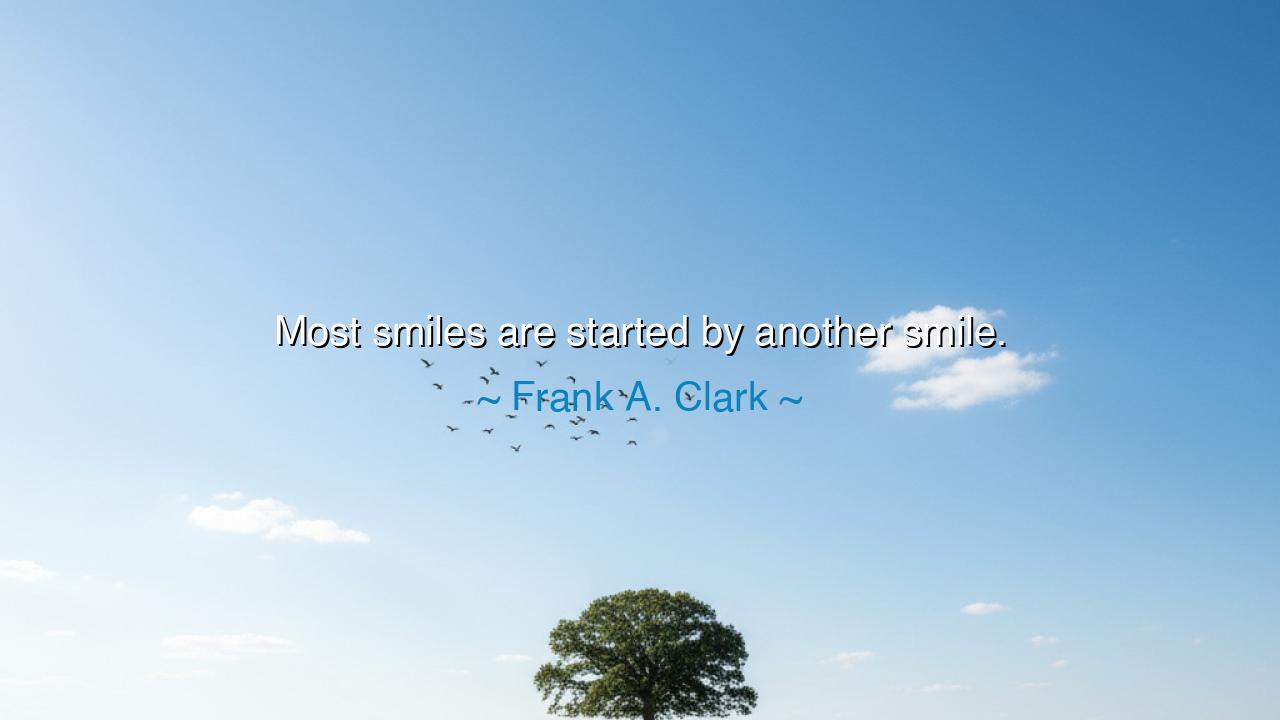
Most smiles are started by another smile.






Hear the gentle wisdom of Frank A. Clark, who spoke with clarity about the nature of joy: “Most smiles are started by another smile.” At first, the saying may appear simple, a quaint observation of human behavior. Yet within these few words lies a profound truth about the power of connection, the invisible threads that bind soul to soul, and the mysterious way that joy multiplies when it is shared. A smile is not only an expression—it is a spark, a flame that leaps from one heart to another, igniting warmth where there was once coldness.
The origin of this thought lies deep in the human condition. We are creatures made for community, not for isolation. Our faces mirror one another, and our hearts respond instinctively to signs of welcome. Science today names this as “emotional contagion,” yet the ancients knew it without such terms: a kind glance, a cheerful countenance, a lifted spirit—all these ripple outward like water disturbed by a stone. Clark captures this timeless truth in the simplest image: one smile giving birth to another.
Consider a real story from history: in the dark days of World War II, Winston Churchill, walking through the bombed streets of London, was seen by survivors of an air raid. Though his heart was heavy, he greeted them with a fierce yet tender smile. That small act, simple yet profound, lifted the weary spirits of those who had lost everything. They smiled back, not because their sorrows were gone, but because hope had entered the ruins. In that moment, Churchill proved the truth of Clark’s words: one smile became the seed of resilience for many.
The ancients also understood the contagious nature of joy. Recall the festivals of old—the Greek Dionysian revels, the Roman Saturnalia, the Jewish feasts of Tabernacles—where music, food, and laughter were shared. These were not merely diversions; they were renewals of spirit, designed to remind the people that joy, once expressed, spreads. A single laugh could ignite a chorus; a single smile could turn the sorrow of a community into celebration. Clark’s wisdom is but a modern echo of this ancient practice.
There is also something heroic in this truth. To smile first, especially in times of darkness, is an act of courage. It is easier to mirror sadness, to sink into the heaviness of the moment. But the one who dares to smile, to lift the corners of the mouth when the world seems grim, becomes a light-bringer. They carry within themselves the power to change the atmosphere of a room, to turn strangers into friends, to give another the courage to face the day. Such a person becomes a silent leader, shaping the spirits of others without command or force.
The lesson for us is clear: if most smiles are started by another smile, then each of us carries the responsibility to begin them. Do not wait for others to lift your spirit—be the one who offers the first warmth. In a marketplace, on the road, at the table with family, or in the weary corridors of work, a simple smile may be the spark that transforms someone’s day. You may not know whose heart you save, but the gift of your countenance may ripple outward further than you ever imagine.
Therefore, beloved, let this be your practice: wear the smile not as pretense, but as gift. Offer it freely, even when your burdens are many, for in giving it you may lighten not only another’s load, but your own. For joy, like fire, grows when shared. And when your life is remembered, it will not be the wealth you gained nor the battles you fought that linger in the hearts of others, but the smiles you started—the sparks of light you set into motion, which carried warmth into places you never thought to reach.






AAdministratorAdministrator
Welcome, honored guests. Please leave a comment, we will respond soon